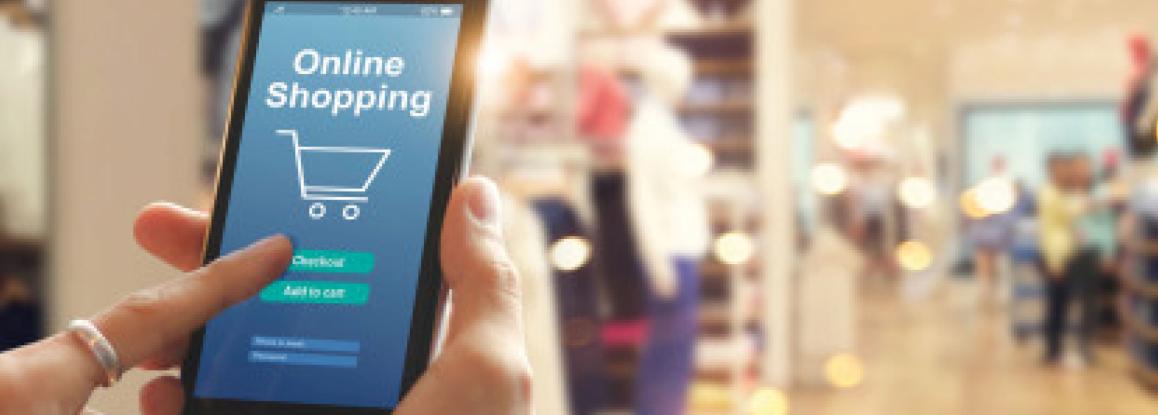It is no surprise that, for many consumers, e-commerce has become the only option. With the forced closure of retail outlets for several weeks, if not months, the growth of e-commerce has seen an explosion, ending up driving new consumer
expectations, and pushing retailers to focus all their attention exclusively on online sales. Even with the re-opening of physical shops, the experience created by the global pandemic is already showing that is had made a lasting effect on purchasers’
habits: the e-commerce quota of total retail sales over the past few years was already growing rapidly beforehand, but the current crisis has accelerated it significantly.
According to a report by Episerver, which explores the various changes and the e-commerce strategies adopted across all sectors from the luxury market to the new social commerce platforms and AR & VR tools (virtual purchases) that
the brands have embraced to reach consumers in their own homes, the revenue achieved from online sales in April 2020 had already greatly exceeded that of previous months and years. Online traffic, in particular, has increased by 30% compared
to the previous year and by 15% for the same month: tariffs are up by 22% in a year and 18% in a month. Online purchases have increased by 89% compared to April 2019, causing sellers to have to face new challenges. Indeed, e-commerce offers
companies complete control over the way in which their products are visualised, and subsequently selected, online. It is therefore vital that companies continue to manage to reach consumers at home, offering quick and easy access to their
products.
In May 2020, Pepsi came out with two new sites to offer a wide range of foods and drinks: Snacks.com offers over 100 varieties of potato crisps and sauces, while PantryShop.com offers the top-selling
drinks and snacks. These new channels, created and launched on the market within less than a month, guarantee shipping in just two days for nearly all orders. But more than that, it enables Pepsi to extract user data and to continue
over time to manage their relationship with consumers, finding out about their buying habits and working out which direction their strategies should take.
Likewise, beauty brands with a strong wholesale distribution channel have relied on the online option: Tula Skincare has made considerable investments in the growth of their own e-commerce and sales of the brand
from their website in April increased by 500% compared to the previous year, helping the company to claw back revenue lost during lockdown. Many companies, though, were already re-modelling their retail sales way before Coronavirus came along,
but today, more than ever, they need to concentrate their efforts on the web and create platforms capable of controlling and increasing sales in the long term too.
There is also a level of high alert amongst the luxury brands that are trying to raise levels of virtual consultation for their products. The fashion boutique, Très Bien, which has shops in London and Sweden, has
launched a virtual version of their shop on Zoom, where customers can phone and have a personal conversation with sales staff. The objective is not fundamentally to sell a product, but to offer a window shopping experience during normal shop opening hours.
Harrods offers personal shopping to some of its major customers and staff of the large department store accept orders from customers remotely.
Harrods offers personal shopping to some of its major customers and staff of the large department store accept orders from customers remotely.
Luxury Soho is a new luxury online e-commerce shop created by Alibaba, geared towards young consumers interested in China, where they can discover and buy designer labels online and potentially purchase luxury products.
A service that has come about in response to the fashion industry's need to guarantee brands’ efficient management of their inventory and stocks. Online market-places have stepped up their efforts to offer support to brands struggling during
the pandemic, using their platforms to put the spotlight on small local shops and businesses.
Zalando, for example, has harnessed the pandemic as an opportunity to increase their platform, offering brands the chance to reach 32 million customers. In April, Farfetch launched a new section of the platform called
#supportboutiques where customers can find a selection of articles from small local boutiques, with items discounted by 25%.
Amazon is also gaining market share. Brands are developing effective strategies to involve users on emerging social media platforms such as TikTok, which has seen a huge growth since the start of Covid-19 (equivalent
to 27% in March 2020). Levi's, for example, has used the “Buy Now” feature of TikTok for a promotional campaign, doubling the views of the denim product pages. Thanks to lockdown, consumers have therefore become
familiar with technology, even using tools that they had never previously used. Another new idea to come out of all this is the virtual shopping party, which lets people “go out” with their friends to do some online shopping. Amongst the main
platforms is Squadded, developed by Elysa Kahn, brand manager for L'Oréal and a platform which is compatible with various e-commerce fashion websites such as ASOS, Boohoo, Sephora, Pretty Little Thing and Missguided and
which gives users the chance to chat to their friends and ask their opinions about the articles on sale. All which can only be purchased online.


